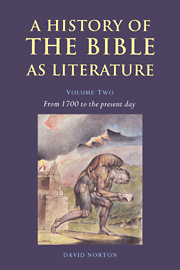Book contents
- Frontmatter
- Contents
- List of abbreviations
- 1 The early eighteenth century and the KJB
- 2 Mid-century
- 3 The critical rise of the KJB
- 4 Romantics and the Bible
- 5 Literary discussion to mid-Victorian times
- 6 The Revised Version
- 7 ‘The Bible as literature’
- 8 The later reputation of the KJB
- 9 Narrative and unity: modern preoccupations
- 10 This (spiritual) treasure in earthen/earthenware/clay vessels/pots/jars
- Appendix
- Bibliography
- General index
- Biblical index
4 - Romantics and the Bible
Published online by Cambridge University Press: 05 June 2012
- Frontmatter
- Contents
- List of abbreviations
- 1 The early eighteenth century and the KJB
- 2 Mid-century
- 3 The critical rise of the KJB
- 4 Romantics and the Bible
- 5 Literary discussion to mid-Victorian times
- 6 The Revised Version
- 7 ‘The Bible as literature’
- 8 The later reputation of the KJB
- 9 Narrative and unity: modern preoccupations
- 10 This (spiritual) treasure in earthen/earthenware/clay vessels/pots/jars
- Appendix
- Bibliography
- General index
- Biblical index
Summary
Forerunners and the influence of the KJB
‘Nunc est bibendum’ or ‘eat, drink and be merry’
Blake, perhaps, Wordsworth, Coleridge, Byron, Shelley and Keats — these are the central figures of English romantic poetry. As far as their religious views are concerned they are as diverse a group as one could wish to find — profound and indifferent, orthodox and unorthodox, Christian and non-Christian — yet they share a biblical upbringing in a time when a favourable literary opinion of the KJB had become established. They are the first major literary group to have this in common, so it is of particular interest to see how they responded to the Bible, whether it influenced their work, and whether this heritage produced an attitude to the Bible that, in spite of their religious variety, was more or less shared by them all.
Two other factors of interest to us lie behind their work: a few of their predecessors had already moved towards new ways of writing poetry that had some indebtedness to the KJB (from our point of view, Blake belongs with these poets rather than with the romantics: he is the central pre-romantic poet of the Bible). Less obviously significant but still relevant is a somewht new way of quoting the Bible which has its origins in both the alehouses and the classics (‘nunc est bibendum’).
- Type
- Chapter
- Information
- A History of the Bible as Literature , pp. 136 - 175Publisher: Cambridge University PressPrint publication year: 1993



